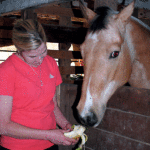This marks my final post for Horse Journal – it has been a wonderful four years of collaborating with a truly exceptional group of horse experts.

I hope that our no-nonsense approach to everything equine has proven valuable to you, our loyal readers. Of course, I won’t pass up this opportunity to impart the best advice I can think of, taking into account my experience and training as a horse vet. Here goes:
1) There is no such thing as a silver bullet. Trite? No. Tried and True? YES. When some guy at a county fair tries to sell you raspberry juice and tells you that it will cure everything that ails your horse, please remember that this is the oldest archetype in the book. The fabled panacea – oh how it has given veterinarians headaches over the years! Many a horse have been puzzled as to why they are being given the concoction, many owners have pulled all-nighter blog fests trying to convince everyone that they have found the fountain of youth, and many, many sales folk have laughed (hard) all the way to the bank.
2) With that said, keep an open mind. There are new products, devices, therapies and methods emerging every day. While some are, ahem, minimally useful, others can actually help. As you come across new ideas, take some time to really look into them.
3) Always talk to your veterinarian when researching new items. In fact, you should talk to your vet about anything that concerns you with your horse. A scab that isn’t healing could be just a minor issue of management. But then again, it could be cancer. So skip the chat rooms, don’t worry about the opinion of the woman with eight horses who reuses paper towels to save on expenses, just pick up the phone and ask your vet.
4) If your horse is acting up, whether it is under saddle or in hand, don’t pull the “behavior” card until you have thoroughly explored all physical possibilities for the behavior. Teeth. Ulcers. Hocks. The list goes on and on. If your horse is basically happy, yet uncharacteristically acts out only under specific circumstances, it is possible that pain may be involved. Check it out – you may be surprised at what you find.
5) Remember that horses age just like we do. If your horse is older, his or her needs may change. Dietary, medical and management practices should evolve to match your horse’s needs. For instance, an older horse may need a blanket, and just because he or she has “never had a blanket before” does not negate the present requirement.
6) Finally, from the sum of everything I have come to know about horses, enjoy each and every day with your horse because you never know which day will be the last. I have seen things happen to horses that I would have never imagined possible, all of which serve a reminder that our time with them is fleeting. Take some time each day to enjoy their presence in your life – it is a truly special gift.
And with that, my loyal friends, I bid you farewell.







